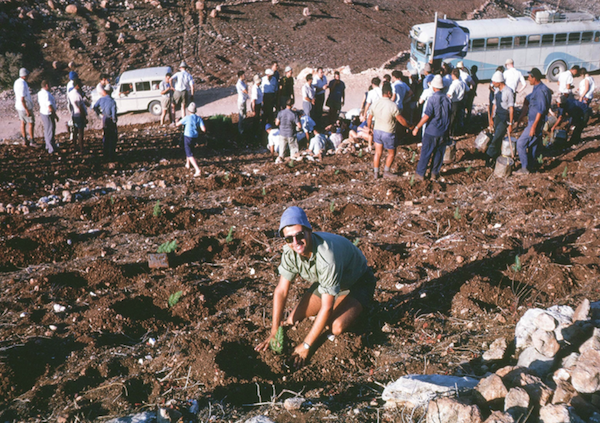Panel speaker Dr. Arthur Dodek in 1963, planting a Jewish National Fund tree as part of the second World Jewish Youth Convention. Dodek was in Israel representing the Student Zionist Organization of North America. (photo from Arthur Dodek)
The Zoom event in Jewish National Fund, Pacific Region’s virtual sukkah on Oct. 8 was seamless and stimulating. Moderator and presenter Dr. Arthur Dodek led the presentation on heart health with a five-minute overview of risk factors. Drs. Saul Isserow, Zach Laksman and Josh Wenner each presented as well, enlightening the audience in easy-to-understand language on topics of cardiology, also in just five minutes each.
But why was JNF Pacific Region hosting a talk on heart health? Well, every year, JNF hosts a Negev Dinner, raising funds for a specific project. This year, in collaboration with the Israeli organization Save a Child’s Heart (SACH), the fundraising supports the building of a cardiac treatment room, as well as a Holter (a heart-rhythm test) room, at the Wolfson Medical Centre in Holon. The sukkah event was the second in the campaign, the first having been held on Aug. 30, for which Dr. Saul and Lindsay Isserow were honourary chairs (jewishindependent.ca/negev-campaign-goes-virtual). Isserow being a prominent cardiologist led to the idea for this second event, an educational panel on heart health.
The funds raised by this Negev campaign will help SACH focus on doing what they do best – saving the lives of some of the most vulnerable children in the world who are born with heart defects. According to Ilan Pilo, executive director of JNF Pacific Region, many of the young patients are from the Palestinian territories and some come from Lebanon and Syria. As well, there are a number of patients from African nations who have been brought to Israel for surgery, accompanied by their families. “There is a beautiful house for the families, like Ronald McDonald House, but it is an African island in suburban Israel,” said Pilo.
At the Oct. 8 panel, Dodek – using data from a variety of studies – summarized the main lifestyle and medical coronary risk factors. At the top of his list was cigarette smoking, which has decreased in prevalence by nearly 30% since 1965. Diet and cholesterol were other major factors of heart disease, with a Mediterranean or Japanese diet recommended to reduce the chance of cardiovascular events. Blood pressure is also a key issue, and Dodek touched on the benefits of a lifestyle that includes stress and weight reduction, as well as exercise.
Isserow picked up on this theme. In providing a practical, Jewish-oriented take on the best way to maintain long-term cardiac health, he said, “The best bang for your buck from a cardiac point of view is simply getting off your tuches and walking for 30-40 minutes per day.” He mentioned having a l’chaim with friends as a way to lower blood pressure, while stressing that having physical activity as part of a daily routine is beneficial not only for the heart but for myriad other areas of health.
Taking things to another level of complexity, Laksman successfully simplified the subject of atrial fibrillation (a chaotic and irregular heart beat). He spoke about the heart’s rhythm and the causes of heart rhythm disorders, as well as treatment options. He explained that age is the number one cause of atrial fibrillation, but added, “Bad habits, alcohol, probably being number one.” Other factors include genetics, really intense endurance exercise, stress and pollution. Laksman discussed how it feels to experience atrial fibrillation and offered some easy tips, including that people should learn how to take their own pulse, to determine their condition.
Wrapping up the cardiologist panel was Wenner, the youngest of the doctors. Having volunteered for Save a Child’s Heart in Israel before entering his cardiology program, Wenner had a firsthand connection with SACH’s work. But the focus of his talk was COVID-19 and the heart. One of the most important takeaways was the importance of continuing to take heart medications appropriately and regularly to maintain health regardless of rumours in the media about contraindication with COVID. One of the other points Wenner made was that people should go to the hospital if necessary. “Based on the raw data, in March and April … the overall death rate, excluding COVID patients, was significantly higher and the best theory for that is that people were staying home with their acute cardiac and other conditions,” explained Wenner.
JNF Pacific Region president Bernice Carmeli concluded the evening with a more detailed explanation of the fundraising goals and the collaboration with Save a Child’s Heart.
The event proceeded with limited breaks between speakers and short comments by the moderator. “I was asked to give my best 45-minute talk in 12 minutes and I said I can’t do it, but it turned out to be my best talk,” commented Dodek.
For those who weren’t able to attend the event, most of the program was recorded and can be accessed on YouTube or by contacting Pilo at the JNF Pacific Region office, 604-257-5155 or [email protected]. More information can be found, and donations made, at jnf.ca/vancouver/campaigns/negev-campaign.
Michelle Dodek is a freelance writer, who also happens to be the daughter-in-law of the moderator (for full disclosure). Her husband, who is a doctor, says she has the medical knowledge of a third-year medical student.

